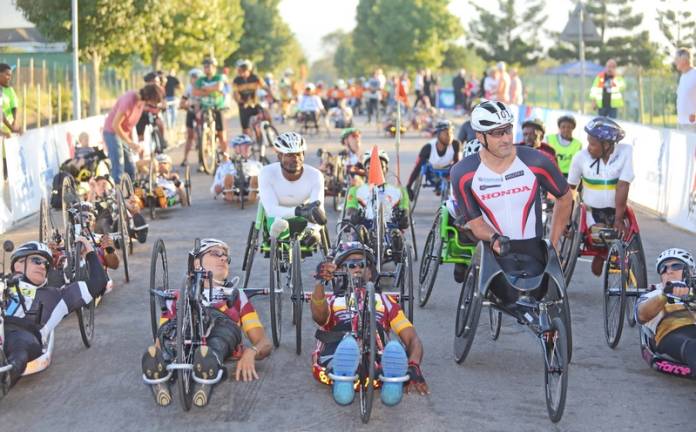
The 20th Outeniqua ‘Chair Challenge (OCC) takes place on Saturday February 24, hosted by the Disabled Road-race Foundation with George Municipality as premier partner, and the support of select provincial and local organisations and businesses.
Athletes from all over South Africa and a substantial contingent from elsewhere on the continent will descend on George for the weekend, with registration at Carpe Diem School on Friday the 23rd preceding that evening’s official opening ceremony.
Serious athletes signing up for OCC24 in the marathon and half-marathon categories include SA racing legend and Paralympics 2020 gold medallist Pieter du Preez, and Ghanaian marathon star Botsyo Nkegbe, both of whom had won gold in the OCC 42km race before.
Lining up in the senior male quadriplegic marathon category will be fellow former winners Eugene Steyn and Stuart McCreadie. Other big names to look out for on the marathon and half-marathon routes will be Andre Koen and former female winner Justine Asher.
Last year’s 21km winner Shaun Butler will be joined on this route by Syborn Modesto, and other regular OCC competitors to look out for on Saturday include Amos Nkosi, Sister Maseko, Sakkie Conradie and Peter West. And among competitors on the 10km starting line will be another famous South African – hers being a slightly different claim to fame.
Martelize Brink is much more than just a popular RSG radio presenter, food-and-wine aficionado, and all-round inspirational livewire. Since losing the use of her legs practically overnight as a teenager, she has been adamant that this so-called disability will not stand in her way.
On the eve of OCC24, it is apt to share her philosophy on grabbing life by the horns: “Be hardegat in a diplomatic way.” This directive to be determined in the nicest possible way is a nutshell version of her advice to people in wheelchairs, or anyone labelled as differently-abled: you are in control of people’s perceptions, and participating in the OCC is a big enabling statement.
“It’s a two-way street: society needs to wake up to our realities, but is also not going to become more comfortable with people in wheelchairs, the blind or deaf among us, if we don’t make a point of proving our resolve to go out there and live normal lives,” she says.
On half a dozen previous occasions, Martelize has tackled the chair-race challenge – in the process significantly furthering its organisers’ cause by punting this unique event through her participation and national exposure. It is the only continental gathering of its kind designed exclusively for chair racers and social participants in wheelchairs.
George locals will remember that last year’s OCC was blessed with rain: great for farmers, not so much for racers. Martelize says her “normal” wheelchair was harder to navigate and the wetness made it nearly impossible to get a proper grip – but here she is, back again for more of the same, come shine or rain.
“I’m looking forward to Saturday, but I’m also a little scared. Last year was hard in the rain and I’m competing in a normal rather than sports wheelchair.” However, Martelize’s repeat participation is not only about challenging her own perceived limitations.
Her relationship with head event organiser Alewijn Dippenaar was forged in a shared pursuit of answers to the rather hefty question: why is it so important for wheelchair users to enjoy an active life? The annual OCC is a glaring example of the benefits of active participation, be it along the competitive racing routes or as 5km fun-rider.
“People may not realise that for many participants, the OCC presents a singular opportunity to get out of the house. It may also force you to expose yourself to an uncomfortable situation. It’s human to lean in the direction of comfort.
“Many differently-abled people spend most of their time at home, afraid of exposing themselves to unfamiliar circumstances. I’ve learnt to throw myself into such circumstances, because I’m hardegat. The world makes boxes and, unfortunately, people tend to move into those boxes. In the end, we act as we are treated,” she says.
“We have to teach society to change – to treat us differently but not take away our dignity. If you are going to complain that a restaurant does not cater for you, go to that restaurant and prove that there are people in wheelchairs with money to spend. You have a responsibility to show the world how you should be treated.”
Martelize travels extensively, and has a slew of bad experiences to share when it comes to ignorance and maltreatment by international airlines and other service providers, even in world-renowned tourism destinations. “Try getting a taxi from the Arc de Triomphe in Paris… in a wheelchair.”
She says this terrible trend will only be changed if you seize opportunities and engage proactively with your community to help you in this quest. “The world needs to wake up and realise that there are many easy solutions. Practically, you can turn one 10cm step to your entrance into a ramp that easily accommodates chair users. It costs nothing.”
Martelize reminds that the world of social media is your oyster. “You’re always going to run into people who don’t or won’t spare a thought for your circumstances. It’s up to you to show them: these are my skills, these are my talents. The media provides a means to tell your story and change the world, one post at a time.”
Saturday’s OCC will provide a platform for all of the above. And finally, Martelize encourages not only participants but the general public to do what they do best through their support and patience. “It means a lot when people on the side of the road cheer you on. The public’s tolerance of the temporary traffic upheaval is also highly appreciated.”
Contact Alewijn Dippenaar at [email protected] or on 082 457 5675 for additional information, or get in touch with Disabled Road-race Foundation chairman Shaun Butler on 083 701 8387.

